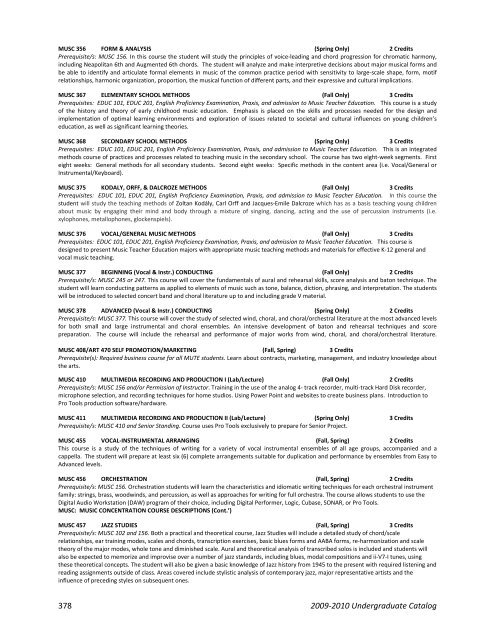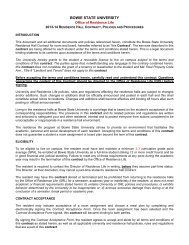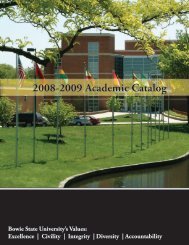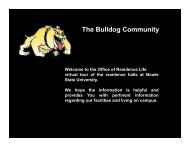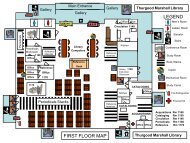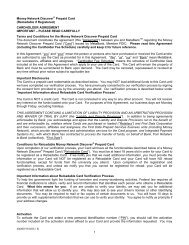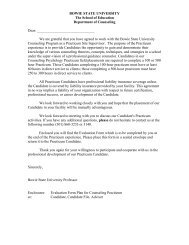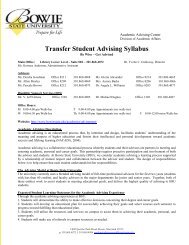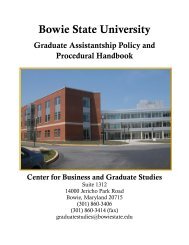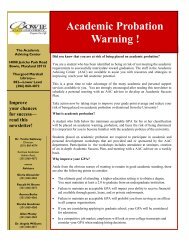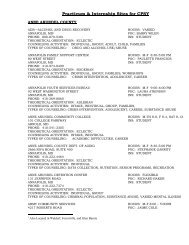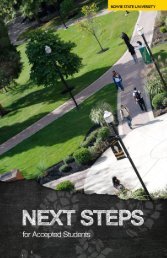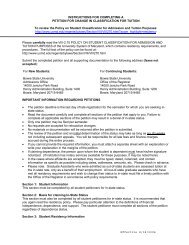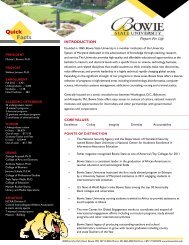2009-2010 - Bowie State University
2009-2010 - Bowie State University
2009-2010 - Bowie State University
You also want an ePaper? Increase the reach of your titles
YUMPU automatically turns print PDFs into web optimized ePapers that Google loves.
MUSC 356 FORM & ANALYSIS (Spring Only) 2 Credits<br />
Prerequisite/s: MUSC 156. In this course the student will study the principles of voice‐leading and chord progression for chromatic harmony,<br />
including Neapolitan 6th and Augmented 6th chords. The student will analyze and make interpretive decisions about major musical forms and<br />
be able to identify and articulate formal elements in music of the common practice period with sensitivity to large‐scale shape, form, motif<br />
relationships, harmonic organization, proportion, the musical function of different parts, and their expressive and cultural implications.<br />
MUSC 367 ELEMENTARY SCHOOL METHODS (Fall Only) 3 Credits<br />
Prerequisites: EDUC 101, EDUC 201, English Proficiency Examination, Praxis, and admission to Music Teacher Education. This course is a study<br />
of the history and theory of early childhood music education. Emphasis is placed on the skills and processes needed for the design and<br />
implementation of optimal learning environments and exploration of issues related to societal and cultural influences on young children’s<br />
education, as well as significant learning theories.<br />
MUSC 368 SECONDARY SCHOOL METHODS (Spring Only) 3 Credits<br />
Prerequisites: EDUC 101, EDUC 201, English Proficiency Examination, Praxis, and admission to Music Teacher Education. This is an integrated<br />
methods course of practices and processes related to teaching music in the secondary school. The course has two eight‐week segments. First<br />
eight weeks: General methods for all secondary students. Second eight weeks: Specific methods in the content area (i.e. Vocal/General or<br />
Instrumental/Keyboard).<br />
MUSC 375 KODALY, ORFF, & DALCROZE METHODS (Fall Only) 3 Credits<br />
Prerequisites: EDUC 101, EDUC 201, English Proficiency Examination, Praxis, and admission to Music Teacher Education. In this course the<br />
student will study the teaching methods of Zoltan Kodály, Carl Orff and Jacques‐Emile Dalcroze which has as a basis teaching young children<br />
about music by engaging their mind and body through a mixture of singing, dancing, acting and the use of percussion instruments (i.e.<br />
xylophones, metallophones, glockenspiels).<br />
MUSC 376 VOCAL/GENERAL MUSIC METHODS (Fall Only) 3 Credits<br />
Prerequisites: EDUC 101, EDUC 201, English Proficiency Examination, Praxis, and admission to Music Teacher Education. This course is<br />
designed to present Music Teacher Education majors with appropriate music teaching methods and materials for effective K‐12 general and<br />
vocal music teaching.<br />
MUSC 377 BEGINNING (Vocal & Instr.) CONDUCTING (Fall Only) 2 Credits<br />
Prerequisite/s: MUSC 245 or 247. This course will cover the fundamentals of aural and rehearsal skills, score analysis and baton technique. The<br />
student will learn conducting patterns as applied to elements of music such as tone, balance, diction, phrasing, and interpretation. The students<br />
will be introduced to selected concert band and choral literature up to and including grade V material.<br />
MUSC 378 ADVANCED (Vocal & Instr.) CONDUCTING (Spring Only) 2 Credits<br />
Prerequisite/s: MUSC 377. This course will cover the study of selected wind, choral, and choral/orchestral literature at the most advanced levels<br />
for both small and large instrumental and choral ensembles. An intensive development of baton and rehearsal techniques and score<br />
preparation. The course will include the rehearsal and performance of major works from wind, choral, and choral/orchestral literature.<br />
MUSC 408/ART 470 SELF PROMOTION/MARKETING (Fall, Spring) 3 Credits<br />
Prerequisite(s): Required business course for all MUTE students. Learn about contracts, marketing, management, and industry knowledge about<br />
the arts.<br />
MUSC 410 MULTIMEDIA RECORDING AND PRODUCTION I (Lab/Lecture) (Fall Only) 2 Credits<br />
Prerequisite/s: MUSC 156 and/or Permission of Instructor. Training in the use of the analog 4‐ track recorder, multi‐track Hard Disk recorder,<br />
microphone selection, and recording techniques for home studios. Using Power Point and websites to create business plans. Introduction to<br />
Pro Tools production software/hardware.<br />
MUSC 411 MULTIMEDIA RECORDING AND PRODUCTION II (Lab/Lecture) (Spring Only) 3 Credits<br />
Prerequisite/s: MUSC 410 and Senior Standing. Course uses Pro Tools exclusively to prepare for Senior Project.<br />
MUSC 455 VOCAL‐INSTRUMENTAL ARRANGING (Fall, Spring) 2 Credits<br />
This course is a study of the techniques of writing for a variety of vocal instrumental ensembles of all age groups, accompanied and a<br />
cappella. The student will prepare at least six (6) complete arrangements suitable for duplication and performance by ensembles from Easy to<br />
Advanced levels.<br />
MUSC 456 ORCHESTRATION (Fall, Spring) 2 Credits<br />
Prerequisite/s: MUSC 156. Orchestration students will learn the characteristics and idiomatic writing techniques for each orchestral instrument<br />
family: strings, brass, woodwinds, and percussion, as well as approaches for writing for full orchestra. The course allows students to use the<br />
Digital Audio Workstation (DAW) program of their choice, including Digital Performer, Logic, Cubase, SONAR, or Pro Tools.<br />
MUSC: MUSIC CONCENTRATION COURSE DESCRIPTIONS (Cont.’)<br />
MUSC 457 JAZZ STUDIES (Fall, Spring) 3 Credits<br />
Prerequisite/s: MUSC 102 and 156. Both a practical and theoretical course, Jazz Studies will include a detailed study of chord/scale<br />
relationships, ear training modes, scales and chords, transcription exercises, basic blues forms and AABA forms, re‐harmonization and scale<br />
theory of the major modes, whole tone and diminished scale. Aural and theoretical analysis of transcribed solos is included and students will<br />
also be expected to memorize and improvise over a number of jazz standards, including blues, modal compositions and ii‐V7‐I tunes, using<br />
these theoretical concepts. The student will also be given a basic knowledge of Jazz history from 1945 to the present with required listening and<br />
reading assignments outside of class. Areas covered include stylistic analysis of contemporary jazz, major representative artists and the<br />
influence of preceding styles on subsequent ones.<br />
378 <strong>2009</strong>‐<strong>2010</strong> Undergraduate Catalog


